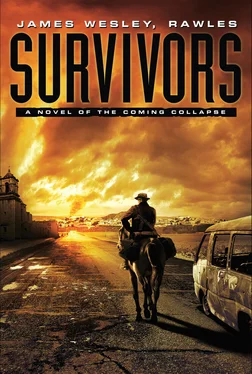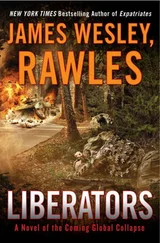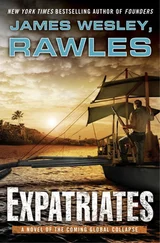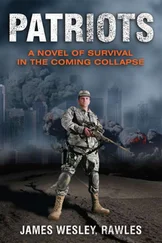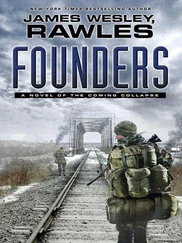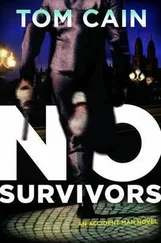The food-grade blue drums that Gabe used for his gasoline had white gaskets in the bungs that swelled slightly but did not deteriorate. These blue plastic drums were stored inside fifty-five-gallon steel drums and shaded from direct sunlight. A dark green tarp was draped over the pair of drums. Mora found that the plastic drums expanded and contracted with the fuel as the temperature changed. With no air venting, the problems of water condensation, evaporation, and other contaminants were solved. And, he surmised, in the event that the thirty-three-gallon drum ever burst unexpectedly, the fuel would be contained within the larger steel drum.
It was on that same trip that Mora bagged the first iguana that Andy had ever seen in the wild. Mora stopped the big lizard with just one shot to the back of its head from his Marlin .22 rifle. This iguana was more than three feet long. It had a fat tail, which Mora said was a sign of good health. Iguana, called “bamboo chicken” by the Mora family, was a favored delicacy. Gabe said that to get his daughter and son-in-law to come visit, all he had to do was tell them that he planned to serve iguana.
During his recovery, Andy continued with his weekly HF radio contacts. More than half of them were successful. It was those Morse code conversations with his brother and fiancee that kept his spirits up.
Gabe Mora had cut back drastically on his driving after the Crunch began. But he would often ride his bicycle to Sarawiwa or even as far away as Dangriga to buy groceries. He would carry his Taurus .22 revolver on those shopping trips. Gabe would frequently spot wild game near the road and bring home some bonus protein.
Bloomfield, New Mexico April, the Second Year
Lars and Lisbeth Laine spent a lot of time in their “ham shack”—a corner of their bedroom—on more than just Tuesday nights. They became avid shortwave listeners, doing their best to keep track of current events by scanning through the international broadcast bands mainly in the high 9 MHz and high 11 MHz ranges, listening to radio stations such as the BBC, Radio Netherlands, Radio Havana Cuba, Channel Africa, HCJB in Ecuador, and NHK in Japan. They also tuned up to 17.795 MHz to hear Radio Australia. It was disconcerting to hear the litany of very bad economic news, refugee movements, terrorist attacks, and massive riots. It was even more disturbing to notice when some of these radio stations dropped off the air.
The Laines also picked up valuable news listening to amateur radio operators from all over the United States. They had the most success listening to hams in the Rocky Mountain region and just east of the Rockies. But they found that it was more difficult for them to hear hams in the Northeast. At first Lars assumed this was because of poor propagation or weak signal strength. But then he came to realize that the real reason so few hams were heard in the Northeast was because of the tremendous societal disruption and the lack of power. Most of the time Lars merely listened to the conversations of other ham radio operators and never used his own microphone. It was only when Kaylee asked him to contact her family near New Braunfels, Texas, that they actually keyed the mic and made contact with a couple of hams. From them they learned that Kaylee’s family was safe and well. He also checked up on Lisbeth’s family in eastern Colorado. They learned that her mother had died in a diabetic coma but that her father and brother were still alive and working at a grain mill. Lars was never successful at checking up on his relatives on his mother’s side. The Bardgard family lived in Minnesota, one of the places where the population die-off was severe. There, a combination of harsh winters and relatively high population density combined to produce a huge depopulation.
“This present window of opportunity, during which a truly peaceful and interdependent world order might be built, will not be open for too long-We are on the verge of a global transformation. All we need is the right major crisis and the nations will accept the New World Order.”
— David Rockefeller, addressing the United Nations Ambassador Dinner, September 14, 1994
Sarawiwa, Belize February, the Third Year
To get ready for his upcoming departure, Andy started buying compact backpacking foods and extra batteries for his ham radio and SureFire flashlight in Sarawiwa and Dangriga. He also solicited letters of introduction from both Gabe Mora and the consul from the American embassy.
After Andy had declared himself fit to travel, Gabe said, “I can give you a ride as far as Orange Walk, but first I will make inquiries about horse breeders there. I know that there are several. I’ll give you a letter of introduction that you can carry.”
At dinner two days later, Gabe announced: “I found you a horse breeder. His name is Pedro Hierro, and his ranch is just north of Orange Walk, not far off the Northern Highway. I hear he has some of the best horses in the district.”
Knowing that he was soon likely to depart, in the privacy of his bedroom Andy pulled out his Primus stove. Working with a screwdriver, he extracted two of the duct-tape-wrapped one-ounce gold coins and then he carefully reassembled the stove heat shield.
Andy felt bad that the checks that had been sent to Darci by the U.S. State Department were worthless. So he gave Gabe his set of bicycle tools and his big Maglite flashlight, explaining that he needed to cut down on weight for his upcoming journey. After some prayer, he also gave Darci a one-ounce American Eagle, one of his last few remaining gold coins. As he handed it to her, he said, “You have been such a blessing. You have always made me feel welcome here, and I have shared your food-with your delicious cooking-for many months. This is the least that I can do to thank you. I won’t take no for an answer.”
Their drive to Orange Walk was enjoyable. Gabe pointed out a number of sights and filled Andy in on some details about the history of the country. As they neared Orange Walk, Gabe started pointing out dozens of Mennonite-owned farms. He explained: “They started moving here in the 1950s. Good folks. When the power grid went down, the Old Order ones didn’t even notice. They don’t believe in electricity. But I’m worried about how they’ve done when the Guatemalan gangs have come through, because they don’t believe in guns, either.”
He dropped Laine off at the front gate of the horse ranch. A simple hand-painted sign read: “Pedro Hierro-Caballos Excelente.” The ranch’s pastures were enclosed in sturdy white-painted welded tubular steel fences that looked like they had taken many hours to construct. A small, stout cinder-block house overlooked the pastures and a hay field.
Gabe said, “I should just leave you here. This guy doesn’t know me, so I think it’s best that you just introduce yourself. He might be more nervous if two of us go up there.”
Andy nodded. Seeing that the gate was locked, he climbed over it. Gabe lifted Andy’s pack over the gate to him, and Andy shouldered it. They shook hands through the gate, and Mora said earnestly, “God will see you safely home.”
Andy nodded and smiled. “And you, as well. Con Dios, Gabe.” He turned to walk up the hill. He saw that there were more than a dozen mares and nearly as many foals in the pasture to his right. Just below the house was a smaller one-horse stallion corral. The horse in it was a fine-looking dark chesnut stallion with a long mane and a gleaming coat. Andy heard Mora’s car driving away.
An elderly man stepped out on the porch and eyed Laine as he approached. A woman about the same age looked on from the open doorway. The man casually cradled a double-barreled shotgun in his arms.
Читать дальше
